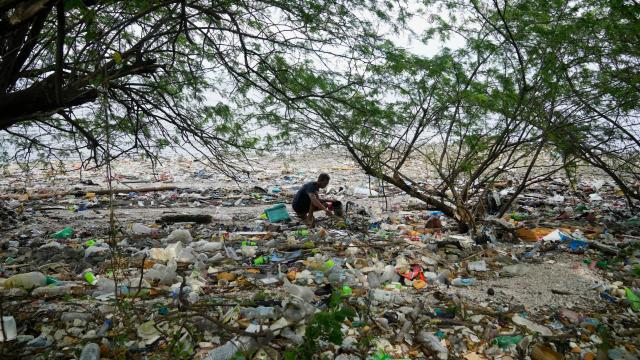Corporate giants vowed change, but are falling short on their promises. Some of the biggest companies on Earth are all but certain to shoot past agreed upon targets to make plastic packaging more sustainable by 2025, according to a report published Wednesday.
Beginning in 2018, hundreds of the world’s largest brands signed on to the Global Commitment, an initiative for tackling the problem of plastic pollution created by the Ellen MacArthur Foundation and the UN Environment Programme. Companies like PepsiCo, Coca-Cola, Unilever, Nestlé, Mars, L’Oréal, and SC Johnson all set benchmarks for themselves surrounding plastic sustainability.
Among other things, they pledged to decrease their use of unrecycled (i.e. virgin) plastic; increase their use of post-consumer recycled material; move to 100% recyclable, reusable, or compostable packaging; and shift away from a single-use model. Yet basically none of the corporations are on track to meet all of their 2025 goals.
And in fact, the report shows many of them are moving backwards. Nestlé went from 49% recyclable/compostable/reusable packaging in 2018 to 45% in 2021. Pepsi said it would decrease its virgin plastic use by 5% from 2020, but instead, it increased by that same amount. Coca-Cola vowed a 20% decrease in unrecycled plastic use from 2019, but used 3% more in 2021. Worse still, Mars Inc. promised a 25% decrease in new plastic use from in 2019, and in 2021 used 11% more.
Consider this your weekly reminder that companies can say whatever they want on sustainability and deliver absolutely nothing. Greenwashing is profitable, but making actual change is hard.
There are some small, relatively positive outlier stats from the new report. For instance, Coca-Cola is reportedly 99.9% to its goal of 100% recyclable/compostable/reusable packaging (up from 99% in 2019). And overall, the report found a slight increase (+1.7%) in the total use of recyclable/compostable/reusable packaging across companies. But that’s much less than what was pledged, and just because something is labelled recyclable doesn’t mean it is.
Most plastics can only be truly recycled a couple of times before they degrade too much for their original use and fall into the downcycling spiral (or the trash). And, even if plastic is technically recyclable, almost none of it actually gets recycled. Just 5% of U.S. plastic waste made it through the recycling stream in 2021, according to a report published earlier this month.
That sad state of affairs was cited by at least one company to deflect the blame. Nestlé reportedly told Reuters that their sustainability goals were impeded by the lack of global recycling infrastructure, a claim echoed in the report itself which described inadequate infrastructure as “the main barrier.” Flexible plastics, like the film that many processed foods are sold in, also pose a challenge as the material isn’t widely accepted by recyclers.
Plastic pollution is a growing crisis that’s infiltrated just about every corner of the planet. Microplastics are being found everywhere, from freshly fallen Antarctic snow to the human bloodstream. Though we don’t yet fully understand how those adulterants are set to affect our health or the environment, research is revealing that they pose a significant threat.
And if we want to avoid experiencing the full fallout of plastic pollution, the petrochemical industry, government policies, and corporations need to take it seriously. A U.N. meeting to negotiate the first ever global plastics treaty is set to take place in Uruguay this month. But, as the Global Commitment failure suggests, promises and pledges to recycle more are simply not enough.
